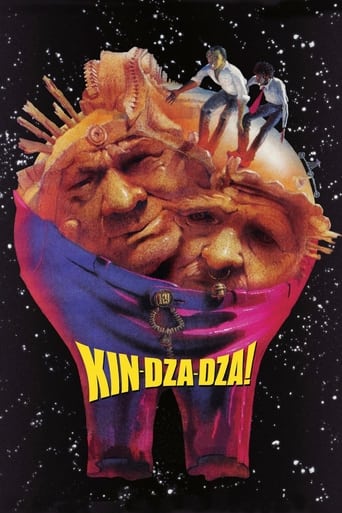Lee Eisenberg
Georgiy Danelia's "Kin-dza-dza!" is part science fiction, part comedy, part social satire. When a pair of passers-by touch a strange object held by a man on a street in Moscow, they find themselves standing on a desert planet in another galaxy. It's a stratified society, a bit like what the Mad Max movies depict. The human-looking inhabitants have their own slang, their own clothes, and their own technology. But there's a lot in store.It's one of the more bizarre movies out there. When you look at what it depicts, it's clear that this sort of movie could have only gotten released under Gorbachev, when the Soviet Union finally started owning up to its mistakes. In general I interpret it as having the same basic gist of some of Terry Gilliam's movies: a look at the desire to escape from our modern world (depicted in "Time Bandits" and "Brazil").Worth seeing.
Zarathustra Iscariot
'Kin Dza Dza' is the kind of film that comes along every once in a blue moon. It's a very simple story of two very ordinary and very different strangers, one Russian, the other Georgian. Whilst going about their normal, every day business they inadvertently become stuck in a rather extra-ordinary situation, with no understanding of where they are or how they got there. The film follows them as they attempt to get home, meeting all manner of strange people with very strange concepts of hierarchy, race, society and culture. A very simple premise. When I first saw this movie I had no idea what I was letting myself in for. I came across it by pure fluke one day in my university's video library when I was looking for an interesting Cold War era Soviet film to watch. It's easy to see why it is viewed as a cult classic by many Russians and Georgians alike. The cinematography is surprisingly enticing. It's not particularly inspired, but it somehow just drifts along with the characters. The shots of the desert are bold and striking, whereas the shots inside ships or inside the nomads' homes are dark, cluttered and uninviting. There are stark differences between all the set pieces, and the director is thankfully skilled enough to make the transitions between these vastly different sets seamlessly. The music is very simple and almost casual as it drifts in and out of focus very subtly with the sequences on-screen. The acting is also something to behold. It fits very much in line with the ethos this film seems to carry: simplicity. The characters in this film range from the stoic and reserved, to the verbose and hyperbolically animated. All the actors play their roles very well, adding memorable nuances to their characters, and really helping to convey the peculiarity and absurdity of the situation being portrayed. The underlying motive of this film appears to be to convey a message of equality. 'Kin Dza Dza' is a film which, through humour and through sheer simplicity, is able to make the viewer realise the absurdity of social and racial discrimination. I whole-heartedly recommend watching it. It's comical, it's whimsical, it's witty and it's poignant. Well worth the time, if you're able to acquire it.
joalogon
Please, before seeing this film, let your political ideologies outside the room and just prepare to laugh with this original pearl.It's fairly unknown outside Russia, and sometimes I wonder if I'm the only Spaniard having seen it....I hope not, such a pity!.This film is a complete classic in Russia and has even transformed local talking, so don't be surprised if you walk one day by the streets of Moscow and you see two friends who meet and say "Koo!" each other, or if someone is bothering and he is sent away by an "Violinist players, we don't need them!".The story is fantastic and engaged. It's one of those films who makes you laugh and sit for a while thinking about life. Maybe you don't agree to everything but is worth the reflexion. The filming is direct and simple (you're going to laugh, but not for the same reasons, special effect's lovers) and the acting is superb.One of the best comedies ever made in Russia.
l_b_s
First of all, sorry for my bad English. :) "Kin-dza-dza" is not a sci-fi at all, actually. This film just uses some stereotypes, the outer seeming of sci-fi. It's not a "classical" anti-utopia also. And it has little in common with "Star Wars". :) "Kin-dza-dza" is a kind of absurdism, in my opinion. Like Kafka or some of David Lynch works, for example… or rather "The Hitchhiker's Guide to the Galaxy" and "Catch 22", in some (humorous) ways. "Kin-dza-dza" uses "reductio ad absurdum" method and surrealistic symbolism to help us open and clear our mind for new aspects, new point of view on human and society, and even humankind. If you understand that fact it helps you to understand the film.Unfortunately it will be not so easy for non-Russian(/Soviet) audience to catch the degree of absurdism, symbolism and how to correlate them to reality. Especially, without high-quality translation and comments. But never say "never", as you know.




